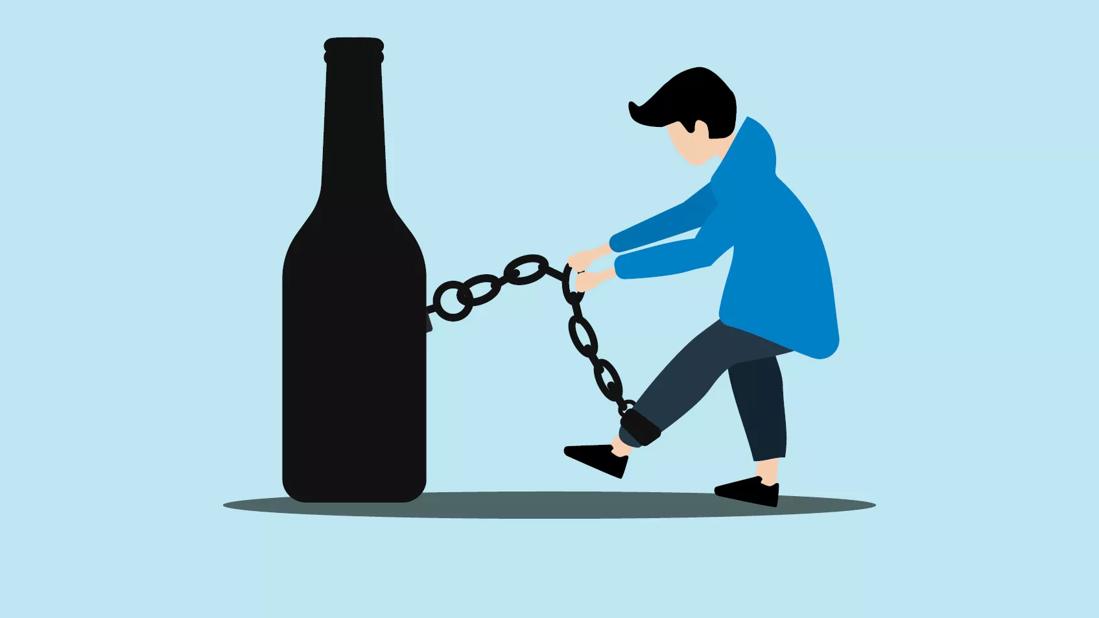Denial is common for many living with addiction, but behavioral red flags don’t lie

Image content: This image is available to view online.
View image online (https://assets.clevelandclinic.org/transform/8f14f73d-99b9-4cc5-ad9a-3351d7a03882/AlcoholAddiction-1224548514-770x533-1_jpg)
Symbolic illustration of a person chained to a bottle to represent addiction
It’s just a few drinks, right? Nothing to be concerned about. For approximately 15 million Americans with alcohol use disorder (AUD), that’s a statement of denial.
Advertisement
Cleveland Clinic is a non-profit academic medical center. Advertising on our site helps support our mission. We do not endorse non-Cleveland Clinic products or services. Policy
Alcohol use disorder is a chronic disease that often goes ignored by the millions in its grasp. Nearly 1 in 13 American men has AUD. For women, it’s 1 in 25. More than 400,000 children are dealing with addiction, too.
“Sadly, it’s common,” says addiction psychiatrist Akhil Anand, MD. “And often, people don’t recognize that they have a problem.”
Here’s how to tell.
Dr. Anand talks about the “Four C’s” regarding alcohol addiction. It’s a simple way of looking at alcohol consumption and determining if it has reached a concerning (and possibly dangerous) level.
The Four C’s of alcohol addiction are as follows:
Advertisement
Let’s start with this basic fact: An addiction is a brain disorder.
Addictive substances like alcohol essentially commandeer the “reward pathway” in your brain. The reward pathway makes mental connections between activity and pleasure.
“Natural things like romance and exercise stimulate the same pathway,” explains Dr. Anand. “But addictive substances artificially hijack it. So, even things that you used to naturally enjoy, you suddenly can’t — because it’s all about that addictive substance.”
Basically, a person with an addiction develops a relationship with a substance that can eventually override everything else in their life. What follows is often described as a “personality metamorphosis.”
“At that point, a person’s actions are built around obtaining whatever their substance of choice is,” says Dr. Anand. “That’s the relationship they work the hardest to protect.”
People who struggle with addiction “do all kinds of terrible things” that impact themselves and those around them, warns Dr. Anand. Someone with AUD will:
“I always emphasize that these behaviors illustrate the severity of addiction, not the person,” stresses Dr. Anand. “It’s important to understand this if you’re trying to communicate with someone who has an addiction.”
Reaching out after recognizing you have an addiction — or talking to someone else about their addiction — can be extremely challenging. Emotions run deep. There are often worries and concerns, and even anger.
“It’s not easy,” acknowledges Dr. Anand. “If you have a loved one who struggles with addiction, be honest, open and nonjudgmental when speaking with them. Communicate in a succinct manner that’s calm and constructive and not emotional. Remember that the goal is to get them help.”
Treatment for AUD often revolves around a plan that includes rehabilitation, care from addiction specialists and self-help programs such as Alcoholics Anonymous (AA). But the process starts with simply identifying the issue.
If you see yourself in the description of the Four C’s or the behaviors connected to personality metamorphosis, talk to someone. Maybe it’s your doctor, another healthcare professional, a family member or friend, or someone in recovery.
“Find someone who can give you support and start the process,” advises Dr. Anand. “Don’t be afraid to take that first step.”
Advertisement
To hear more from Dr. Anand on this topic, listen to the Health Essentials Podcast episode, “How To Help Someone With an Alcohol Addiction.” New episodes of the Health Essentials Podcast are available every Wednesday.
Advertisement

Sign up for our Health Essentials emails for expert guidance on nutrition, fitness, sleep, skin care and more.
Learn more about our editorial process.
Advertisement
Coffee won’t cure a hangover and you definitely shouldn’t mix your cocktail with an energy drink
The short answer from a urologist
Misleading claims, lack of scientific evidence and the risk of over-doing it are all concerns
Drinking during the day can result in drinking more than usual and worsen your sleep cycle
A cold one out in the cold can cause a false sense of warmth and increase your risk of hypothermia
Alcohol affects your whole body, from your liver and immune system to your brain and mental health
Getting rid of excess abdominal fat will take more than just cutting back on cold ones
Often labeled as ‘diabetes-friendly’ or ‘calorie-free,’ this sugar substitute warrants caution
Type 2 diabetes isn’t inevitable with these dietary changes
Applying a hot or cold compress can help with pain
Pump up your iron intake with foods like tuna, tofu and turkey